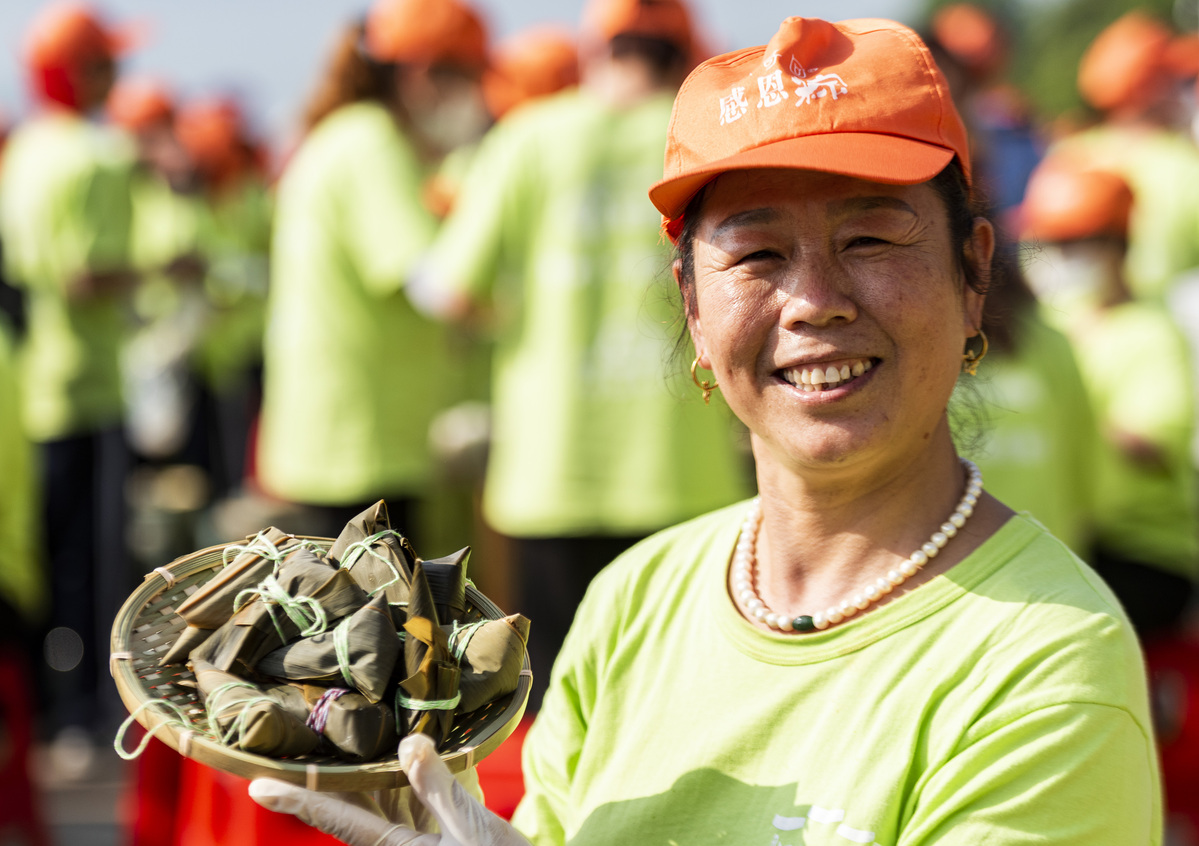'Zongzi' More than Just a Summer Holiday Treat

A woman involved in the event holds a plate of zongzi. [Photo by Zheng Jiayu/Provided to chinadaily.com.cn]
How to hold a reed leaf was just one of the things I learned one evening in my mother-in-law's kitchen in rural Zhejiang province, as she schooled me and my husband Jun in a delicious family tradition.
"Like this," she said, cupping the leaf like a cone, a gesture we tried to imitate by subtly adjusting our own hands.
Next, we learned how much glutinous rice to add, watching her scoop a measuring cup of the grains into her reed leaf before we did the same. Then came the honey dates-only two, she said, placed right in the center and covered by more rice, before wrapping it up with the leaf followed by lengths of string.
Our new creations landed in my mother-in-law's bamboo steamer, transforming them within minutes into that distinctive holiday snack known as zongzi, or rice dumplings.
Except, these zongzi weren't made for that summer holiday in June.
Instead, we had bundled up in down jackets and layers of clothing, warming our hands in turns over the wok as we prepared the treats in the chilly night air, to welcome the arrival of Chinese New Year.
It might seem strange for zongzi, the quintessential Dragon Boat Festival snack, to appear in this winter holiday more associated with jiaozi dumplings. But for some reason, zongzi has transcended these traditional Dragon Boat Festival roots, to become a beloved food at nearly every important gathering in my husband's family in Zhejiang.
Do we owe this to the power of Jiaxing, the hometown of one of the most renowned varieties of zongzi in China? Visitors to Jiaxing can sink their teeth into one of these sticky delights at any time of year. The highway service station for the city even boasts of its own zongzi stands. Once, while passing through during a drive to Shanghai, my husband and I stopped to purchase a generous helping of steaming-hot red bean paste zongzi. Even we didn't want to miss out on the chance to sample what some consider the ultimate version of the snack.
Perhaps Jiaxing, in serving up zongzi all year long, encouraged other parts of Zhejiang province to do the same?
Whatever the reason, zongzi grace many a holiday table in my husband's family, including-and especially-Chinese New Year. My mother-in-law always wraps up mountains ofzongzifor this most wonderful winter festival, enough to feed the entire family multiple times over.
When it's not even a special occasion, zongzi will make their way into family dinners-and care packages too. Many times, my husband has returned to Beijing from a visit to his hometown, bearing a heaping plastic bag of zongzi that goes in the freezer and will last us for weeks.
So if you're a zongzi fan, never fear if your love for this traditional food extends beyond the Dragon Boat Festival. You don't need to wait for the sunny days of June to savor this specialty, as Jiaxing reminds us. And if you're lucky enough, like me, you might just have a family member willing to tempt you with them all year long-and even teach you the art of turning glutinous rice, reed leaves and honey dates into a culinary treasure.
